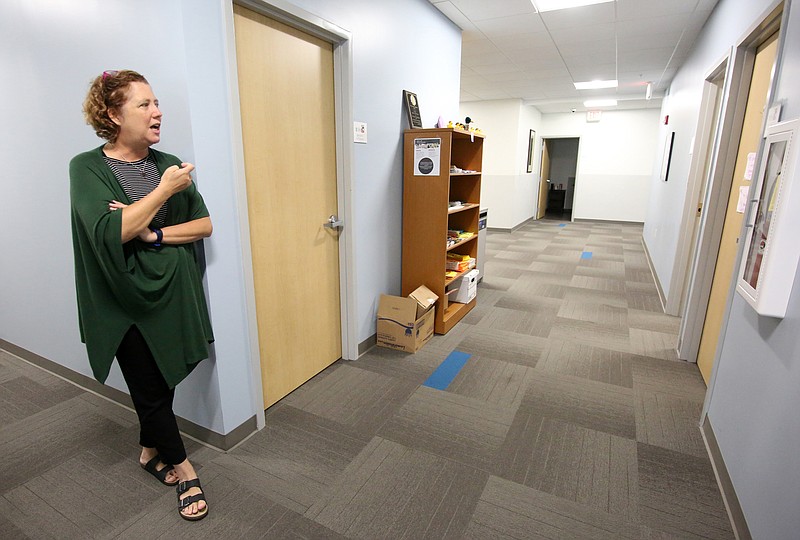For a third year in a row, rates of domestic violence have dropped across Tennessee.
A new report from the Tennessee Bureau of Investigation says there were 73,568 domestic violence offenses reported statewide in 2018. That's a 6% decrease from the year before - one of the largest decreases in recent years. In 2016, there were 79,304 cases.
But while the data seems to show promise, law enforcement officials and advocates say there's still work to be done.
For at least the past decade, Tennessee women have been three times more likely than men to be victims of domestic assault, according to TBI crime data submitted by law enforcement agencies across the state. And while the number of domestic violence incidents across the state has decreased overall, the number of domestic violence-related killings has increased from 87 in 2017 to 98 in 2018. Sexual assault has also increased from 74 in 2017 to 96 in 2018.
Tennessee law defines domestic violence as intentionally inflicting bodily injury or causing fear of bodily injury to a family or household member. It can be between a current or former spouse, or adults or minors who have lived together, dated or had a sexual relationship. It also includes the children of people involved in the relationship.
The more severe the offense, the heavier the charge. For example, if someone is killed, it will be charged as murder. But it will be filed as domestic violence for state reporting purposes.
"Hopefully, the current assessment of domestic violence in Tennessee exposes the need for continued and increased efforts in the battle against domestic abuse within our community," the TBI report states.
While the state has seen a decrease in cases, in Chattanooga, the numbers have increased slightly from 2,133 to 2,296 between 2017 and 2018.
In Knoxville, a city with a population slightly larger than Chattanooga's, the number of domestic violence incidents fell but remain higher than in Chattanooga. There were 2,479 reports in 2017 while 2018 had 2,373.
More Info
Signs to look for if abuse is suspected include:» The person doesn’t leave home very much or only leaves with the suspected abuser.» Has to ask permission to go anywhere.» The person’s money is regulated by the suspected abuser — only has exact change on hand and has to be back home by a certain time.» Unexplained injuries.Source: Family Justice Center
It doesn't necessarily mean there are more incidents, but that there's more awareness about what healthy relationships look like and victims feel more secure in coming forward.
"I think the police have worked hard," said Valerie Radu, executive director of the Family Justice Center. "They're not perfect, but they've worked hard to be more victim-centered. And that does make a difference."
Having a victim services unit within the Chattanooga Police Department has been a big step, Radu said.
"I feel like people in the community are starting to kind of understand that it's a really hard process, but you don't have to do it by yourself," she said. "There are people that will help you. And that's a really big deal."
Officers have also been conducting what is called "lethality assessments." It's a questionnaire designed to provide an accurate picture of how dangerous the victim's domestic situation is.
Case workers with the Family Justice Center or the Partnership then follow up with the victims and walk them through their options.
Statistically, one in five women and one in seven men are likely to be victims of domestic abuse across the country, according to the Centers for Disease Control and Prevention.
"Domestic violence is very pervasive," said Carla Sewell, director of victim support services for the Partnership. "We know that interpersonal-type violence does not know any kind of socioeconomic [boundaries] - it touches all different walks of life."On average, Sewell and Radu said their organizations receive around 1,600 calls - from both men and women - for help per year combined. That's just the people they are able to engage with - sometimes people call or walk in but don't want to give any information.
But the nature of the crimes means not all incidents are reported to police.
Sometimes that's because many victims are still fearful of possible repercussions, Radu said.
Or it could be that they are dependent on their abusers or because children or pets are involved.
"We've had survivors come here that don't have a car, a checking account," she said. "[Sometimes, offenders] abuse the pet, murder the pet, hold it for ransom."
That's where a partnership with McKamey Animal Center comes in to help ensure the safety of pets.
Other times, though, victims may not think it's worth the trouble.
Tennessee laws aren't very strict when it comes to simple assault, which at 49,455 reported incidents in 2018 is the most-reported domestic violence crime. Simple assault means no serious injury was inflicted and/or no weapon was involved.
"The criminal justice system really is set up for offenders; it's not set up for victims," Radu said. "It was only recently, like in the last two decades, that victims even had rights in the criminal justice system."
A domestic assault conviction carries a penalty of up to $5,000 in fines. A second conviction could result in a minimum of 30 days in jail but no more than one year. Three or more convictions can result in a minimum of 90 days in jail or no more than a year.
More severe crimes carry heavier penalties, yes; but it would be under the penalty guidelines of that specific crime. For example, first-degree murder is punishable by death or life in prison if found guilty.
And then there are plea deals. Sometimes, defendants take a plea deal to spend less time in jail rather than taking their chances with a jury and risking a longer sentence if found guilty.
Because of those factors, victims are never pressured into reporting to police, Radu said.
The Chattanooga Police Department's special victims unit is located within the Family Justice Center, but they "stay completely out," said Lt. Scott Bales, Chattanooga Police Department special victims unit supervisor.
"If someone is over there [talking to counselors], we don't want to ask questions," he said. "We trust that [advocates] are going to figure that out, and if police need to be involved, that's when we will get involved."
Having most of the services under one roof makes things much easier, both Bales and Radu said.
"We work together because there are really sensitive cases that we work, and they're hard things to navigate," Bales said. "So it makes it really easy to come over and say, 'Hey, can you help us in this particular area?'"
For those experiencing domestic violence or who aren't sure if they are, Radu and Sewell both said to listen to the little inner voice saying something is wrong.
"If you know that gut feeling, knowing that something is off, the feeling of being trapped. There's so many ways that [domestic abuse] could look, but those are tell-tale signs," Sewell said.
Radu suggested confiding in a friend.
"Tell somebody that you're concerned," Radu said.
For those who know someone in an abusive situation, Radu said to just keep an open line of communication with that person.
"Because you never know when there's an opportunity for that person to say, 'Okay, I'm ready. Will you go with me to talk to somebody?'"
Anyone in an immediate emergency should call 911, but victims also are able to call a domestic violence and sexual assault crisis hotline at 423-755-2700 that is available 24/7. All services - for both men and women - provided at the Family Justice Center are free and confidential, and no appointment is necessary during regular business hours.
Contact Rosana Hughes at rhughes@timesfreepress.com or 423-757-6327 with tips or story ideas. Follow her on Twitter @HughesRosana.

